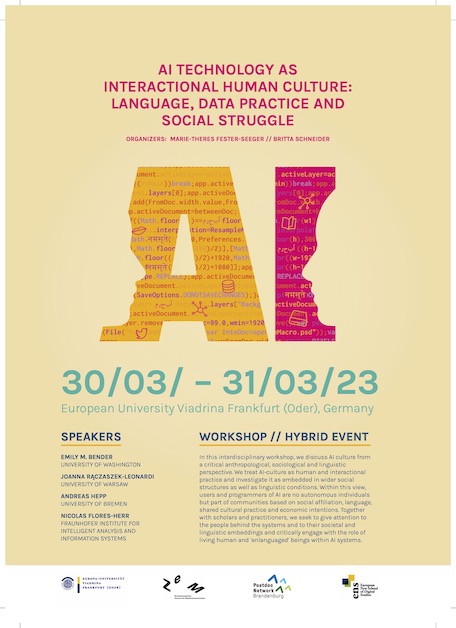AI Technology as Interactional Human Culture
 |
International Workshop // Hybrid EventAI Technology as Interactional Human Culture: Language, Data Practice and Social StruggleMarch 30 & 31 2023, European University Viadrina Frankfurt (Oder), GermanyPlease register with Marie-Theres Fester-Seeger (fester-seeger@europa-uni.de). PROGRAM | BOOK OF ABSTRACTS | VIDEOS
|
In this interdisciplinary workshop, we discuss AI culture from a critical anthropological, sociological and linguistic perspective. We treat AI-culture as human and interactional practice and investigate it as embedded in wider social structures as well as linguistic conditions. Within this view, users and programmers of AI are no autonomous individuals but part of communities based on social affiliation, language, shared cultural practice and economic intentions. Together with scholars and practitioners, we seek to give attention to the people behind the systems and to their societal and linguistic embeddings and critically engage with the role of living human and ‘enlanguaged’ beings within AI systems.
- Emily M. Bender, University of Washington (online talk)
- Joanna Rączaszek-Leonardi, University of Warsaw
- Andreas Hepp, University of Bremen
- Nicolas Flores-Herr, Fraunhofer Institute for Intelligent Analysis and Information Systems
Given that human living beings construct and use AI technologies, we may understand such technologies as a complex type of interactional culture whose human participants are distributed in space and time. In this interactional ecology, language data are central as they ground many constructions and employments. And yet, languages are themselves an outcome of socio-technological histories and histories of inequality and not ‘raw data’. In this sense, data “do not offer access to the social world ‘as it is’ but an access to the procedures whereby powerful organizations attempt to construct a world on which they act” (Couldry and Hepp 2017: 163).
Research questions
With the ambition to create an open discussion that is cross-theoretical, cross-disciplinary and bridges the divide of academic and applied practice, this workshop focuses around the following questions:
- How do social values and cultural traditions, among them beliefs about machines, commercial interests, technological affordances and notions of language frame the development of AI technology?
- How do traditions of writing, established language norms, the dominance of English and people’s beliefs about language shape the programming of speech-enabled AI or translation technologies? What is the role of non-standardised forms, language change and variation, sound-based social positioning, bodily gestures and poetic functions in AI language models?
- How do users co-construct and experience technologies in embodied, language-specific and culturally-shaped ways? How does human-to-human interaction as well as social normative discourse impact people’s use and co-creation of AI-systems in their homes or workplaces? What is the effect of the affordances of machine interaction on users’ speech as an embodied and conversational practice? Related to these practices, what kinds of human language data feed back into servers of companies?
- And, finally, what do we learn from all this with regards to the question what constitutes democratic, culturally-sensitive and human-centred AI?




